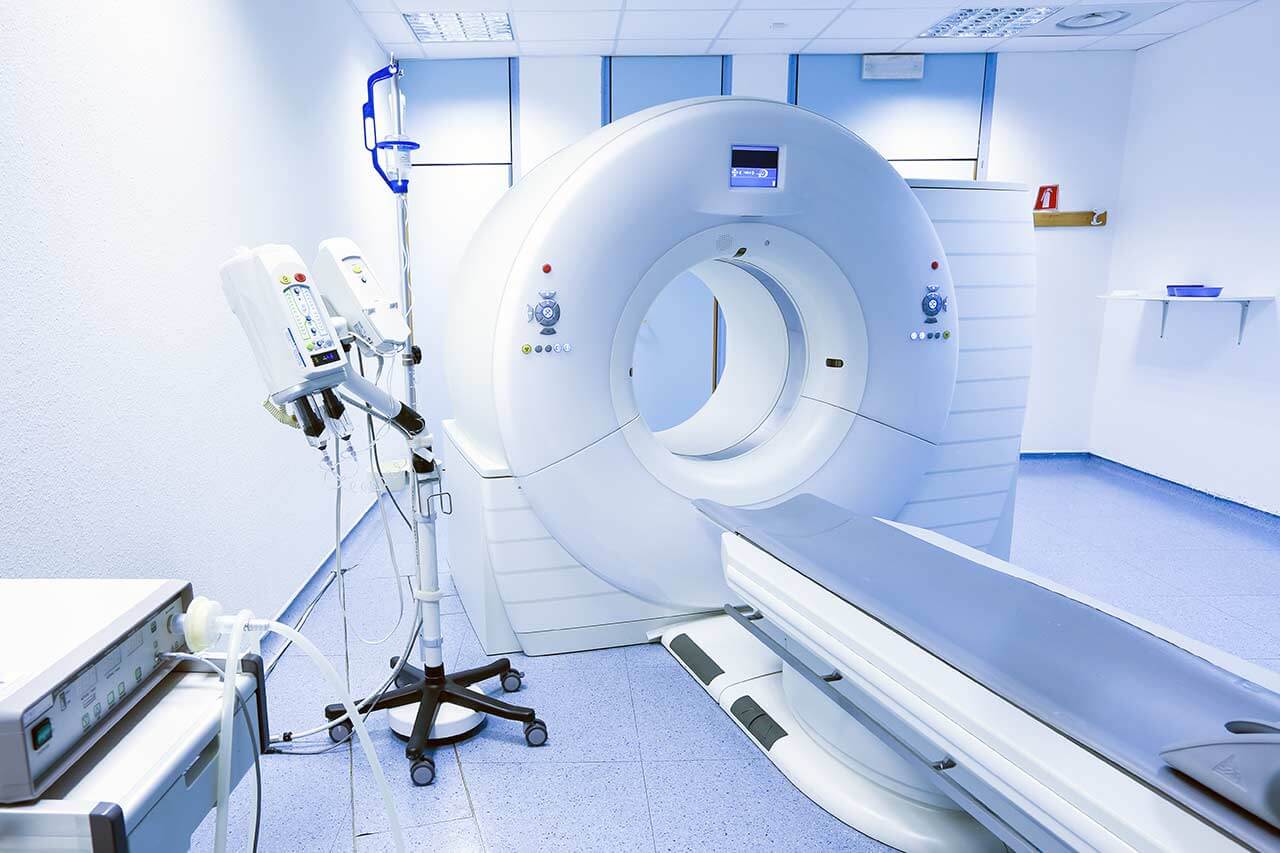
The program includes:
- Initial presentation in the clinic
- clinical history taking
- review of medical records
- physical examination
- laboratory tests:
- complete blood count
- general urine analysis
- biochemical analysis of blood
- TSH-basal, fT3, fT4
- tumor markers
- inflammation indicators
- indicators blood coagulation
- PET-CT (if indicated)
- MRI scan
- proton therapy (full course)
- nursing services
- consultation of related specialists
- treatment via head doctor and all leading experts
- explanation of individual treatment plan
How program is carried out
Proton therapy is the outpatient procedure, you do not need to stay in the hospital all the time.
During the first visit, the physician will conduct a clinical examination, go through the available medical records and CT scans. If necessary, the physician will prescribe you additional examinations in order to clarify the diagnosis and determine the localization of the tumor more accurately.
Preparation for proton therapy begins with manufacturing the special device – the individual immobilizer that will fix the position of your body during a proton therapy session. Immobility is essential for high irradiation accuracy.
After the control computed tomography, during which you will stay in the immobilizer, the healthcare professionals will develop an individual treatment scheme. The treatment scheme determines the number of proton therapy sessions, the radiation dose, the angle of the rays and the depth of their penetration. In accordance with these, technical devices are manufactured that determine the depth and form of irradiation. These are the collimator (determines the shape of the proton beam) and the bolus (determines the depth of the proton beam penetration).
After that, a trial irradiation session is carried out using the individual immobilizer, collimator and bolus. Doctors evaluate the radiation dose received by the tumor and its compliance with the treatment scheme.
Proton therapy. The procedures are carried out once a day, 5 days a week. Usually Saturday and Sunday are your free days when you do not need to visit the hospital.
Before each procedure, specialists check the position of your body using X-ray in two projections. If necessary, the irradiation is synchronized with the respiratory movements. After that, the tumor is exposed to the proton beams for 1-3 minutes. The total duration of the session with all the checking procedures is 15-30 minutes.
The procedure is painless and is performed in open-type devices (this is important for overweight people or people with claustrophobia). Proton therapy does not require bed rest or other restrictions of physical activity.
Monitoring the treatment effectiveness. After completing the treatment, you will be advised to come in for the long-term follow-up. You will visit your doctor regularly for a clinical examination and, if necessary, a CT scan.
Required documents
- Medical records
- MRI/CT scan (not older than 3 months)
- Biopsy results (if available)
Service
You may also book:
 BookingHealth Price from:
BookingHealth Price from:
About the department
The National Center for Tumor Diseases (NCT) Heidelberg offers the full range of diagnostics and treatment of various oncological diseases. Since its foundation in 2004, the center has gained a reputation of one of the leading in Germany. The center is headed by Prof. Dr. med. Dirk Jäger.
The center is supported by the German Cancer Research Center (DKFZ) and the German Cancer Aid (Deutschen Krebshilfe). The center treats about 60,000 patients from 45 countries every year. Thanks to the outstanding research activities, the department has the very latest therapeutic opportunities that save lives for thousands of people.
To provide the best, individualized medical care, the center regularly hosts tumor boards, within the framework of which the specialists jointly consider the case of each patient and make the best decision on the treatment strategy. Attention is also paid to the follow-up care of patients in order to avoid recurrence of the pathology. Since cancer diagnosis is a huge emotional shock, social workers and psychologists actively work with patients. A huge advantage is the opportunity to participate in clinical trials of innovative drugs, treatment techniques, which often help to achieve positive results.
The center specializes in the diagnostics and treatment of the following malignancies:
- Acute leukemias
- Chronic lymphocytic leukemia
- Amyloidosis
- Pancreatic tumors
- Connective tissue tumors (sarcomas)
- Bladder, prostate and kidney tumors
- Intestinal tumors
- Brain tumors
- Breast cancer
- Cancer of the female reproductive system
- Skin tumors
- Head and neck tumors
- Liver and biliary tract tumors
- Lung tumors
- Lymphomas
- Stomach and esophageal tumors
- Multiple myeloma
- Myelodysplastic syndrome
- Myeloproliferative diseases
- Neuroendocrine tumors
- Pediatric tumors
- Other oncological diseases
The therapeutic options of the center:
- Radiation therapy
- Drug therapy
- Chemotherapy
- Target therapy
- Immunotherapy
- Surgical removal of tumors and metastases (in collaboration with the specialized departments)
- Clinical trials
- Follow-up and patient care
- Other treatments
Curriculum vitae
- 1998 - 2000 Postdoctoral Fellowship (Cancer Research Institute), Cornell Medical Center: "Identification and characterization of tumor-associated antigens in melanoma and breast cancer using the SEREX approach" (Y.T-. Chen).
- 2000 - 2003 Group Leader of the Antigen Discovery Program at the Hospital Nordwest, Frankfurt (Director: Alexander Knuth).
- 2003 - 2005 Attending Physician at the Department of Oncology, University Hospital Zurich, Switzerland (Director: Alexander Knuth), Leader of the Laboratory for Tumor Immunology, Coordinator of the Clinical Trial Center Zurich as part of the Ludwig Institute for Cancer Research.
- 2005 Director of the Department of Medical Oncology, National Center for Tumor Diseases, University Hospital Heidelberg.
- 2006 Official Affiliation with the Ludwig Institute for Cancer Research.
Activities in the Scientific Communities, Honors, Awards
- 1998 Rose-Marie-Finnell Memorial Fellowship for Breast Cancer Research.
- Since 2000, Member of the Antigen Discovery Program, Cancer Research Institute, New York and Ludwig Institute for Cancer Research, New York.
- 2001 AVON Award for Breast Cancer Research, Cancer Research Institute, NY.
- 2006 Investigator Award, Cancer Research Institute, New York.
Research Fields
- Analysis of spontaneous interactions of the immune system in developing tumors.
- Identification and characterization of tumor-associated antigens in different tumor types as potential targets for immunotherapy approaches using a serological cloning strategy (SEREX).
- Characterization of tumor-associated antigens and validation for T-cell based as well as antibody based therapies.
- Functional characterization of tumor-associated antigens: implications for therapeutic strategies.
- Evaluation of potential target antigens in clinical trials (antibodies, vaccines).
- Analysis of spontaneous humoral and cellular immune responses in cancer patients as potential prognostic and diagnostic markers in different tumor types.
Photo: (с) depositphotos
About hospital
According to Focus magazine, the University Hospital Heidelberg ranks among the top five hospitals in Germany!
The hospital is one of the most advanced and reputable medical institutions not only in Germany but throughout Europe. There are more than 43 specialized departments and 13 medical institutes which cover all fields of modern medicine. A distinctive feature of the hospital is the presence of unique therapeutic methods for the treatment of complex and rare clinical cases.
Due to successful clinical practice, the hospital has been holding leading positions in the international medical arena for many years. The basis for this popularity is the combination of the very latest technologies, competent specialists, and active research activities, which allows introducing of revolutionary diagnostic and treatment methods, which save lives.
In addition to the outstanding medical achievements, it is worth noting a particularly friendly and pleasant atmosphere, and respectful attitude towards the patient. Both doctors and nursing staff make every effort to meet all the needs and wishes of the patient, pay due attention to each clinical case, and have personal communication with the patient, which contributes to a positive treatment result.
Photo: (с) depositphotos
Accommodation in hospital
Patients rooms
The patients of the University Hospital Heidelberg live in comfortable single and double rooms designed in bright colors. Each room is equipped with an ensuite bathroom with a shower and toilet. The patient rooms are quite spacious, they have a table with chairs for receiving visitors. Roomy wardrobes are provided for storing personal belongings. It is possible to connect to the Internet. In addition, the hospital offers enhanced-comfort rooms with a safe, refrigerator, and upholstered furniture. Patients have 24-hour access to the services of medical personnel.
Meals and Menus
The patient and his accompanying person have a daily choice of three menus. If you for some reason do not eat all the products, you will be offered an individual menu. Please inform the medical staff about your dietary preferences prior to the treatment.
Further details
Standard rooms include:
Religion
The religious services are available upon request.
Accompanying person
During the inpatient program, an accompanying person may stay with you in a room or hotel of your choice.
Hotel
During the outpatient program, you may live in a hotel of your choice. The managers will help you choose the most suitable options.
The hospital offers a full range of laboratory tests (general, hormonal, tests for infections, antibodies, tumor markers, etc.), genetic tests, various modifications of ultrasound scans, CT scans, MRI and PET / CT, angiography, myelography, biopsy and other examinations. Treatment with medications, endoscopic and robotic operations, stereotaxic interventions is carried out here, modern types of radiation therapy are also used. The hospital offers patients all the necessary therapeutic techniques.
- Endovascular treatment of liver pathologies with LigaSureTM, Ultracision® and Habib®-Sealer devices
- Correction of chest deformities in children (Nass operation)
- Minimally invasive direct coronary artery bypass grafting
- Replacement of ascending aorta (David procedure)
- Operations using the da Vinci robotic system
These are primary lung tumors and metastases in the lungs, benign and malignant liver pathologies, thyroid pathologies, gastroesophageal reflux disease, heart rhythm disturbances and heart failure, infertility, fibromyalgia, damages and pathologies of large joints, polyneuropathy and other diseases.
- Thoracic surgery
- Cardiac surgery
- Urology
- Orthopedics and traumatology
- Obstetrics and gynecology
The hospital's team consists of more than 13,000 highly qualified employees




